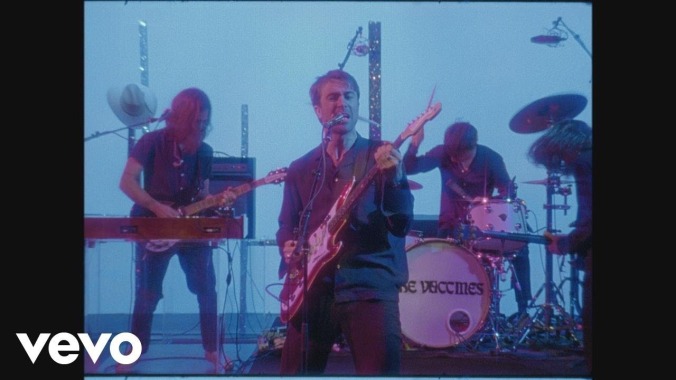The Voidz, The Vaccines, and more albums to know about this week


Virtue’s handful of protest songs are the sound of a white guy who’s led a privileged life trying to find anything to say at a time when artists, understandably, feel obligated to say something. But here, Julian Casablancas is less the iconoclast he fancies himself to be and more a caricature of a stoner philosopher, foisting the most shallow of political and cultural insights on listeners he seemingly assumes are idiots. On “We’re Where We Were,” he astutely reinforces the point already made in the song’s title by singing, “What are you blind / We’re in Germany now, 1939.” On “Permanent High School,” he gifts us sheeple with the advice that “Just because something’s popular / Don’t mean it’s good”—an axiom built into the band’s sound, rebelling against popular concepts like genre, song structure, and listenability. For every adequate Strokes throwback or Radiohead soundalike, Virtue antagonizes you with two formless freak-outs cobbled together from influences as wide-ranging as ’90s R&B, Arabic chants, “Monster Mash,” and a shocking amount of nü-metal. Some of these weirder tracks, like “Qyurryus,” achieve the ugly chic for which Casablancas strives, but more often than not, Virtue is just ugly.
RIYL: The Strokes (but only if you listen to a handful of these songs). Auto-Tone. ’90s kitsch. Falsetto that occasionally verges on physical assault.
Start here: “Pink Ocean,” which complements the Auto-Tuned falsetto Casablancas picked up from Daft Punk’s “Instant Crush” with a funky bedrock of synthesized bass, is a highlight among the album’s few songs that don’t sound like Fred Armisen would be singing them on a musical episode of Documentary Now! [Matt Gerardi]
Some albums feel as much like aural art exhibitions as records. Such is the case with Everything’s Fine, the collaboration between real-life partners Jean Grae and Quelle Chris that crackles with the fury and frustration of contemporary black life, but refuses to fold itself neatly into easily consumable beats and hum-along refrains. The closest comparison would be one of Prince Paul’s old concept albums, as Grae and Chris incorporate sketches (including an opening track that plays like a dystopian nightmare version of the game show that kicks off De La Soul’s 3 Feet High And Rising), numerous unexpected guests (Hannibal Buress, Nick Offerman, Michael Che, etc.), and a withering sense of satire and scorn. The beats range from hollow minimalist rhythms to throbbing Death Row-style bass to jittery jazz-inflected syncopation, but all within a framework of washed-out production and tag-team verses from the rappers, covering everything from police shootings to breakfast foods and often sending up the narcotizing effects of popular culture—including via ironic repetitions of the title phrase. It’s a sprawling and intentionally distancing record, but never less than fascinating.
RIYL: Jean Grae. Quelle Chris. Old-school, concept-album hip-hop. Surrealism.
Start here: The lengthy, withering “Gold Purple Orange” captures the ambitious nature of this multi-tiered project. [Alex McLevy]
Frankie Cosmos (née Greta Kline) makes her Sub Pop debut with her third album, her sweet, ethereal voice delivering a new batch of alterna-pop love songs. Vessel offers a collection of breathy snapshots of twentysomething life in Midtown Manhattan, like hanging out with “Jesse” (“Me and Jesse stayed up until 2 / We talked about dreams, we talked about you”). Some of her ditties don’t even top a minute, as in the appealing piano plinks of “Ur Up,” and some of her rhyme schemes can get a bit laborious (“I’m living in a condo / It replaced your favorite movie theater though”). But she bookends this multitude of shorter songs with longer tracks like album opener “Caramelize,” an apt verb to describe the deepening of a relationship, and the poignant title-track closer, which offers an old-soul wistfulness that belies its slight, poppy setup.
RIYL: Post-teen angst. New Girl. Kevin Kline movies. High octave ranges.
Start here: “Caramelize” kicks out of Kline’s trademark breathiness to offer a toothy attitude (and guitar line) a few of the other tracks could have used as well. [Gwen Ihnat]










![HBO teases new Euphoria, Larry David, and much more in 2026 sizzle reel [Updated]](https://img.pastemagazine.com/wp-content/avuploads/2025/12/12100344/MixCollage-12-Dec-2025-09-56-AM-9137.jpg)




























